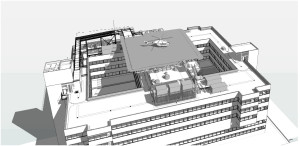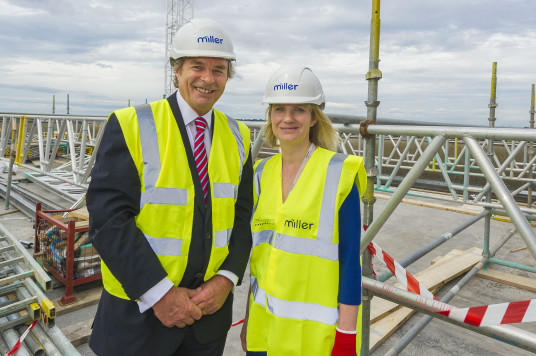Helipad construction gets off the ground
The biggest crane in the UK has been assembled at St George’s Hospital in Tooting where it is helping to build a helipad.
Partly funded by The HELP (Helicopter Emergency Landing Pads) Appeal, a 25m by 25m helipad will enable seriously ill patients from the capital and counties to the South of London to be brought by air ambulance for treatment at the hospital’s Major Trauma Centre. A lift shaft in the middle of the wing is being built so that patients can be lowered quickly and smoothly into the hands of medical experts.
The helipad – which is due for completion in January 2014 – is being constructed by Miller Construction and will be the second hospital helipad in London and the first south of the river.
Announced in September 2012, with support from Mayor of London, Boris Johnson, the helipad will help save the lives of people living, working and commuting in the region. By significantly reducing transfer times to the Major Trauma Centre, patients with serious injuries, such as those caused by road accidents, shootings, stabbings, major burns and falls from height can be treated more quickly, rather than being taken to hospitals further afield, often flying over St George’s.
Supporting the project during its announcement in September last year, Boris Johnson, said, “This is a fantastic project which will help save the lives of many Londoners and will improve our healthcare service. St George’s Hospital will be only the second hospital in the Capital with a helipad and the first one south of the Thames which is why it is so significant.
“I commend the HELP Appeal for working tirelessly to ensure as many hospitals in London and across the country have the funding they need to build such life-saving facilities.”
The HELP Appeal, which has provided a grant of £1 million towards the construction of the helipad at St George’s Hospital, is a charity established by the County Air Ambulance Trust to help fund much needed helipad facilities at emergency departments across the country.

3D image of the helipad plans
Heather Jarman, Clinical Director for Major Trauma at St George’s University Hospitals NHS Foundation Trust, said: “It’s great to see the progress being made with the construction and the crane on site – a sure sign that a major step forward in the care of seriously ill patients is being made right here at St George’s.”
She added: “The hospital’s reputation for its trauma care has grown, quite rightly, over the years. As well as the HELP Appeal and the Mayor, we have had the support of the local authority and residents to develop the helipad. Our Major Trauma Centre already has the facilities and staff to provide expert care and we look forward to being able to receive the most seriously injured patients to St George’s sooner than ever before.”
Robert Bertram, Charity Director, HELP Appeal, says: “It is always great to witness our projects coming together, and being able to see the first stage at St George’s in action today has been truly rewarding. We hope construction runs smoothly and the helipad is up and running and saving lives the early part of 2014.”
Chris Webster, Chief Executive, Miller Construction added: “The installation of this crane is a significant and highly visible milestone in the construction phase of this major project. When operational the new helipad will provide additional capacity to the skies of the capital that will help to save many lives. We will work to ensure this life-saving facility is delivered safely for the people of London.”
Notes to editors
For more information and for high resolution photography, please contact the Communications Unit on 020 8725 5151 or email: communications@stgeorges.nhs.uk. Outside working hours, please page us by calling 0844 822 2888, leaving a short message and contact details for pager SG548. High res photos available on request.
About major trauma
Major Trauma Centres have specialist facilities for looking after patients with serious life-threatening injuries, such as stabbings, gunshot wounds and injuries resulting from serious road traffic accidents. The principle of the trauma network is that the ambulance crews are trained to take patients to the nearest hospital with appropriate facilities to treat their injuries; this means that patients with the most severe injuries are identified and taken quickly to the Major Trauma Centre, often bypassing the nearest hospital.
About the HELP Appeal
The lack of onsite helipad facilities at hospitals is a growing issue costing many lives each year. The HELP Appeal has already helped to fund new or improved helipads at several key hospitals across the country and is currently in discussion with several more. The HELP Appeal solely relies on charitable donations and need public and corporate support and donations to keep funding these life saving facilities. Donations can be made by calling 0800 389 8999 or visiting www.helpappeal.co.uk.
The Helicopter Emergency Landing Pad (HELP) Appeal was established by the County Air Ambulance Trust to help raise funds for much needed hospital helipad facilities across the country. Only a small number of hospitals have onsite helicopter landing pads and this means that transfer times are increased. Most air ambulance patients have to be transferred by road for part of their journey which takes time and can often mean a life threatening transfer is needed from the helicopter to the road ambulance.
The HELP Appeal is aiming to significantly increase the number of onsite hospital helipads through its HELP Appeal grant scheme which offers non-repayable grants to hospitals to help fund new and/or existing hospital helipad facilities.
The Appeal has already funded helipads at Oswestry Spinal Injuries Hospital, Gloucestershire Royal Hospital and Southampton General Hospital and is currently talking to around twenty hospitals from Plymouth and Bristol to Leicester and Manchester about their helipad needs and how the Appeal might be able to help with this life-saving equipment.
The HELP Appeal relies solely on charitable donations and does not receive a single penny in government funding or from the National Lottery so please do help and donate what you can.
How to donate
Donate whatever you can to the HELP Appeal by simply calling the donation helpline on 0800 389 8999, visiting the website www.helpappeal.co.uk or donating by text, just type HPAD22 plus the amount into the message box and send it to 70070. Donation will be charged to your mobile bill.
About St George’s Hospital’s Major Trauma Centre
St George’s Hospital is the Major Trauma Centre serving the South West London and Surrey region. It has a very experienced consultant-led trauma team and has 24/7 consultant cover to deal with critically ill and injured patients around the clock. The hospital has been operating a state-of-the-art trauma facility for over two years and is one of only a few hospitals to benefit from a state of the art CT scanner in its A&E department. Since becoming a Major Trauma Centre in April 2010, St George’s Hospital has helped to save dozens of additional lives across London and the South East.
About St George’s University Hospitals NHS Foundation Trust
St George’s University Hospitals NHS Foundation Trust is one of the largest healthcare providers in the UK. Its main site, St George’s Hospital in Tooting – one of the country’s principal teaching hospitals – is shared with St George’s, University of London, which trains medical students and carries out advanced medical research. As well as acute hospital services, the trust provides a wide variety of specialist and community hospital based care and a full range of community services to children, adults, older people and people with learning disabilities. These services are provided from Queen Mary’s Hospital, Roehampton, 11 health centres and clinics, schools and nurseries, patients’ homes and Wandsworth Prison.
St George’s Hospital, Tooting, is one of four major trauma centres and one of eight hyper acute stroke units for London.
The trust is an accredited centre of excellence for trauma, neurology, cardiology, cancer and blood pressure services, and the national centre for family HIV care and bone marrow transplantation for non-cancer diseases.
For more information, visit www.stgeorges.nhs.uk


